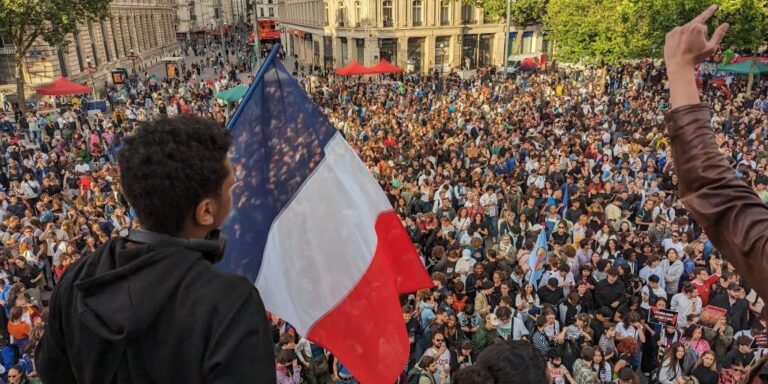- President Emmanuel Macron has taken a huge gamble by calling snap elections in France.
- Macron risked losing what little power he had in the National Assembly to France’s far-right bloc.
- Voters rebuked the far-right party on Sunday, but now no political party holds a majority.
French voters are expected to reject the far-right anti-immigration National Rally party, but no clear majority emerged on Sunday, leaving President Emmanuel Macron’s centrist alliance further weakened and France on the path to political deadlock.
Macron took a huge gamble in June by calling snap legislative elections shortly after the National Rally, France’s far-right bloc led by Marine Le Pen, beat the president’s centrist Renaissance party in European Parliament elections by more than twice the number of votes for his coalition.
The results prompted Macron to dissolve the National Assembly – France’s lower house that holds a more important place in parliament because of its ability to pass laws – and take a huge gamble by calling early elections.
Macron hoped that voters would give him a stronger mandate in the lower house and increase his influence on the international stage. The president, whose popularity in France was already declining, lost his majority in the National Assembly in 2022, leaving his coalition to push through laws without a vote in the lower house using a controversial but legal constitutional tool.
The New York Times reported that Macron, without a majority in the lower house and relegated to political maneuvering, said his decision was inevitable.
But the bet backfired.
On June 30, the National Rally again dealt a major blow to Macron’s Renaissance party and its allies by winning 33% of the vote in the first round of voting, which saw a high turnout.
The New Popular Front, a left-wing coalition formed for the early elections, won 28% of the vote.
Macron’s centrist coalition won only 20% of the vote.
For a brief moment, France appeared to be witnessing the emergence of the first far-right government since the Nazi occupation, according to the Associated Press.
However, in Sunday’s second round of voting, the Times reported that a surge in support for the left-wing New Popular Front was projected in the near-final results to give it the most seats in the 577-member lower house, but not a majority, citing French pollsters.
According to the Times, the left-wing alliance is expected to win between 177 and 180 seats.
Macron’s centrist coalition, Ensemble, which includes the Renaissance party, came in second with 148 predicted seats, while the far-right National Rally came in third with 142 seats.
Jean-Luc Mélenchon, leader of the left-wing alliance, called the results “a huge relief for a majority of people in our country,” the AP reported.
Although the results allayed immediate concerns among leftists and centrists about a far-right government, France could be heading toward a political impasse without a clear majority in the National Assembly.
The final results are expected on Sunday evening or Monday.


